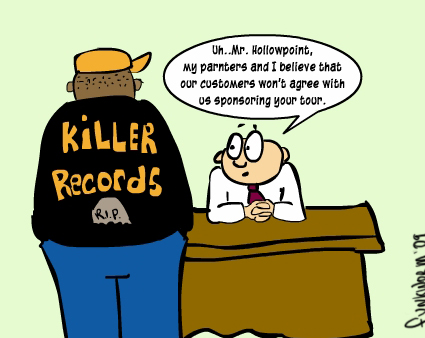Starting a label is easy. Running one…well that’s another story. Most
independent artists start record labels only to release their own, personal material. Sometimes they never go further than creating a name and logo, but at some point they feel the need to take the potential growth of the label more seriously. This involves getting licensed as a business and signing other artists. I’ll outline some of the important steps to starting a functional, indie record label.
1. Funding: You first need to figure out how you’re going to pay for the costs associated with running a label. This usually covers the recording of projects, manufacturing, marketing and promotion.
2. Your business plan: So many businesses fail because their starters don’t take the time to plan out how their business will consistently earn money or how they’ll face the many challenges of running it. Create a business plan to measure how your label will sustain itself.
3. Choosing a name: Please give careful thought to choosing a name for your label. Keep in mind that in the future, you may decide to branch out beyond the boundaries of hip hop. Choosing a name like “Real Gangsta Records” may prevent you from getting that Toys R Us sponsorship you were looking for. Seriously though, choosing a bad name alone can create unwanted obstacles for you.
4. Trademarking a name for your label: This is very important! I’ve witnessed many start up labels put in a lot of work building a big buzz for their label, only to find out they have to change it because someone else owns the name. Search the trademark database, online, to find out if the name you’ve chosen is available. It costs around $300 to trademark a name. This is something you can do yourself, online.
5. Incorporate your business: Decide whether you want your business to be a sole proprietorship, partnership, or corporation. Do more research on each of these and find out which one fit your needs. You’ll also need to get a “retail merchant’s” license because you’ll be selling goods to the public.
6. Lock down and register an internet domain name: This is another base you want to have covered even if you don’t plan to put up a website right away.
Signing Artist: Consult an entertainment attorney about creating contracts for your company if you plan to sign artists to your label. Repeat: get an ENTERTAINMENT attorney. This can save you from having a lot of legal issues in the future.
Running a label takes a lot of dedication, but the rewards can be great if you’re willing to stick with it. Seeking legal counsel is always best if you’re not sure about the process.
If you enjoyed this post, please comment or subscribe.

